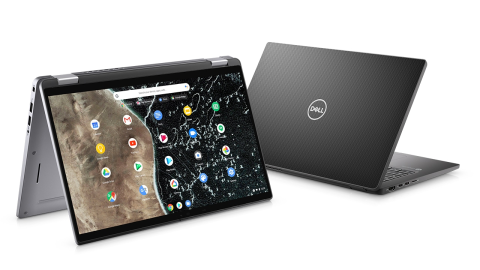
In-person exams on a computer
Is this page relevant to me?
Your department will tell you if an in-person exam is going to be completed on a computer (also referred to as a typed exam). Where an exam is to be completed on a computer, the location of the exam in your individual examination timetable will also contain the prefix 'COMP_'.
This page is NOT relevant to you if:
You are sitting a paper-based (handwritten) exam.
You are sitting an 'Online exam'. Online exams are sat at a location of your choosing, via the internet. Please refer to the Online Exams webpages for more information.
The default mode of completion for your exam is handwritten, but you have permission to type your responses as part of an approved exam adjustment. The way you complete your exams will differ from the arrangements described on this page.
What computer will I use for my exam?
Most in-person, typed exams will take place on a Chromebook. The Chromebooks have touchscreens, with a built-in trackpad.


Candidates sitting in the Doctoral Training Centre's (DTC) computer suites will use a desktop computer.
These exams are closed-book, invigilated exams, so access to applications and websites outside of Inspera will be restricted during the exam.
What is the layout of the keyboard?
All devices provided for University examinations have an English-language keyboard in the standard QWERTY layout.
Please note: Chromebooks do not have a Caps Lock key. For capital letters you will need to hold the Shift key while holding the letter you need to be capitalised. It may be useful to practice this in advance of your exam(s)
Alternative Language Keyboards.
Requests for alternative language keyboards are being phased out. Only those students who previously had alternative language keyboard requests granted will be able to apply to use one this academic year 2025/26. No new permissions will be granted. For those eligible, you can apply for an alternative language keyboard here.
We would highly recommend that students practice using a UK QWERTY keyboard in advance of their exam(s).
Will I have an opportunity to use the University computer before my exam?
Yes, we will be holding orientation sessions for any students wishing to see what the Chromebook looks like, or who wish to practice using the Chromebooks. These informal drop-in sessions will take place at Exam Schools and also give you the opportunity to familiarise yourself with the layout of the venue. Members of the Exams team will be available in the room to answer any questions you may have about your exam format.
For those with Hilary Term and Trinity Term 2026 exams, orientation sessions are bookable via Eventbrite here. Mock Exams will be available to book in due course.
Can I sit a mock exam on the University computer?
Mock exam sessions will be available to book in the same way as they are for handwritten exams. Details of any upcoming mock sessions are available here.
Please note that spaces for the orientations and mock exam sessions are limited. If you can no longer attend, then please cancel your place to allow for someone else to take it.
What else should I do to prepare for these exams?
As is the case for all formats of examination, the time you have to prepare should largely be spent revising what you have been taught and thinking about the academic content of your exam responses. However, you should set aside a small amount of time to do the following:
1. Read the guidance on the 'In-person exams' webpage
The 'In-person exams' webpage takes you through what to expect on the day of an in-person exam, including the dress code and expectations of student conduct.
2. Set up your mobile phone as an authentication method
The exam will be completed on Inspera. This is a cloud-based digital assessment platform, used by the University for multiple formats of examination and for coursework submissions.
You will log into Inspera using your University Single Sign-On (SSO), which involves a Multi Factor Authentication (MFA) step. You are required to bring a mobile phone to the exam to complete this step. Other methods of authentication are not possible within the exam room.
Please therefore ensure you know your SSO username and password, and that you have registered your mobile phone as an authentication method for MFA using the instructions linked below:
MFA setup and management | IT Help (ox.ac.uk)
Prior to the exam, you should also check that no alarms are set on your phone for the time you will be in the examination room.
3. Learn more about Inspera
If you haven't completed an exam on Inspera before, we recommend watching our introductory video guide. You can view this in MS Stream.
You can also log into Inspera and access the available demo tests whenever you want. From the Inspera dashboard, go to the 'Demo tests' tab. Answers to a demo test are not saved, and you can attempt a demo test an unlimited number of times.
Closer to the date of your first exam, you will be provided with a practice test. When available, it can be accessed under 'My Tests' in Inspera. The questions may not be subject-specific, but the practice test will reflect the layout of your exam (or set of exams).
4. Watch our preparation video guide. You can view this in MS Stream.
I have an approved exam adjustment. How will this work for computer-based exams?
For general information on exam adjustments, please see the exam adjustments webpage. The information below is specific to computer-based exams and only applies to students with approved adjustments.
Extra time
If you are entitled to extra time, this will be added to your exam duration within Inspera. If you have extra time of up to 15 minutes per hour, and no other adjustments that require you to sit in your college, you should expect to sit computer-based exams in the main venue. The seating plan will be designed to minimise disruption to candidates who are sitting papers with a longer exam duration than others and/or are entitled to extra time.
Use of a word processor
If you have an adjustment to complete your exams on a word processor, you may have (in the past) sat your exams separately to your peers, in a computer room. In an in-person, computer-based exam, all students are provided with a computer on which to type their answers, and you should therefore expect to sit these exams in the main venue (unless you have additional adjustments that require you to sit your exam in your college). All candidates in the main venue will complete their exams using the word processor in Inspera, and a spelling checker will be turned on by default for all candidates.
Rest time
If you are entitled to rest time during your exam, this will be added to your exam duration within Inspera. If you are entitled to extra time and rest time, your additional time will appear in Inspera as a single combined value. You are expected to manage your extra time within the exam autonomously. The invigilator will, however, ask you to raise your hand should you need to leave your desk; for example, to stretch during a rest break.
College sitting
If you sit your exams in college, you will be provided with a University Chromebook on which to complete your exam (as described above). This will be set up in the exam room before your exam. If you have an approved exam adjustment to use your own computer (for example, because you require use of assistive technology), you should bring this device with you to the exam room.
Students with a Specific Learning Difference (SpLD)
For students with a Specific Learning Difference (SpLD), you do not need to attach an Inclusive Marking Guidelines (IMG) form to your work in Inspera. This will be managed by your department after your exam response has been submitted.
Use of assistive technologies
Arrangements will vary depending on the technology used and your specific requirements. If you're expecting to use assistive technologies during your exam, please contact your college office or disability advisor in the first instance.
Alternative modes of completion
If you have a disability or medical condition which means you need an alternative mode of completion to the one set for your paper, you will need to apply for this through the exam adjustments process.
I'm concerned about noise in the exam room.
Feedback so far has indicated that the sound of typing in the exam room provides a comfortable white noise and is not distracting. However, if you are concerned about this, you may want to bring in-ear ear plugs to the exam. These are permitted in the exam room for all formats of exam. Headphones are not permitted.
What contingency plans are in place?
Your computer-based exams have been designed to minimise the risk of disruption during an exam. For example, in the unlikely event that there is a problem with the WiFi during an exam, you will be able to continue entering your answers into Inspera. These will then be synched to the Inspera servers when the WiFi returns.
In the event of major disruption, the Exams team are able to pause, or delay the start of, your exam by up to 30 minutes. Although the risk of this is low, if a situation does arise that cannot be resolved in this time frame, printed versions of the Inspera examination will be distributed and you will be aked to handwrite your responses.
As is the case for all examinations, disruption to the examination process will be reported to the Proctors Office and the relevant Chairs of Examiners.
Has consideration been given to using secure exam browsers on students' own devices, rather than providing University devices?
This has been considered, but a number of factors have led to the decision to provide University devices this year. The main reason is to ensure that all students have an equitable experience when sitting their exam. Moreover, use of student's own devices could see variances in battery-life, etc. which could impact on the exam.
What can I do to improve my typing skills?
If you would like to practice your typing skills in preparation for your exam, there are many free online resources to help you assess and improve your speed and accuracy. Links to some available sites are below:
Can I make handwritten notes outside of Inspera?
All candidates sitting their exam on a computer will have access to 'rough workings' paper. If you use this paper, please remember that it will not be seen by the examiners marking your responses. After the exam, all 'rough workings' paper will be collected and disposed of in the confidential waste.
You are not permitted to bring scrap or note paper into the room with you - this will be provided.
I need to draw diagrams or graphs as part of my exam response, as well as typing text-based answers.
The Inspera text editor has an in-built drawing tool, which you may find sufficient to insert a diagram into your answer.
'Inspera Response Sheets' will also be available in the exam room, which you can use to draw diagrams, graphs, equations or other content which cannot be entered directly into Inspera. If your department think you are likely to use these, they will request that they are laid on your desk in advance of the exam. However, you can always raise your hand to request an Inspera Response Sheet or additional Response Sheets from the invigilator.
Inspera Response Sheets must not be used for rough working or text-based elements of an answer.
For more information, see the guide to 'Using an Inspera Response Sheet' (PDF).
If you have a query that has not been addressed on this page, please contact the Exams team using the 'Computer-based exams' help form.